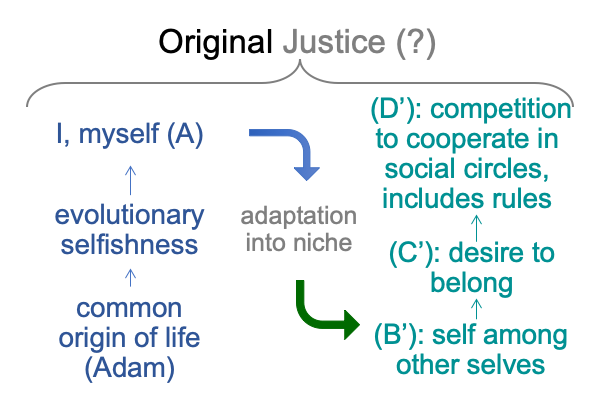0049 In the competition to cooperate (D’), one must have theories of mind. One must be able to anticipate the desire to belong (concupiditas, C’) of others. One must fashion the selves of oneself and others (B’) through clues, including the expression of emphatics, such as I-myself, in various situations (A).

0050 In the end, a deep irony emerges.
These alternate technical formulations of cupid (B’), concupiditas (C’), and concupiscence (D’) describe original justice, not original sin. In other words, the niche of triadic relations allows forms of cooperation (associated to the goddess Venus) that are so rewarding that original selfishness drives us to compete (associated to the god Mars) in order to participate and flourish in cooperative social circles.
Does the term, “original justice”, describe the state of humans in the Lebenswelt that we evolved in?
Concupiscence (D’) is so adaptive that we evolved a willingness to sacrifice, even die, for one another.
0051 The most productivity-oriented social circle is the team. Being a member of a successful team increases self-preservation and reproductive success. Teams are task oriented, voluntary, opportunistic and spontaneous. Teams are most effective in scavenging resources in mixed forest and savannah, where opportunities are seasonal and varied. Teams are so successful that they share their bounties with family, band and community. Hand talk is an adaptation to team activity.
So, why do I say that the human niche is triadic relations, rather than cooperation?
0052 Cooperation and competition already are adaptations into the niche of evolutionary selfishness. Domning is clear on this. Original selfishness is a psychological adaptation that spontaneously expresses one’s presence. That psychological adaptation opens the door to the realization of self. That realization is not a thing. It is a triadic relation.
Is this way the technical definition of cupid (B’), proposed here, is precisely the opposite of the thing known in Greek mythology as Cupid, who is not a relation at all.
